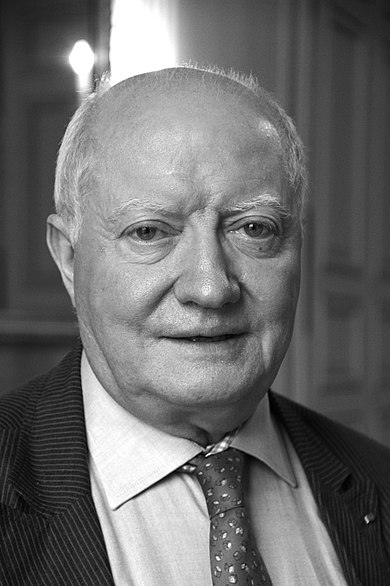
Death of Chairman Jean-Paul Costa
JEAN-PAUL COSTA (1941-2023)
With the death of Jean-Paul-Costa on April 27, 2023, our Foundation has once again been hard hit. His simplicity, benevolence and generosity had won him all our hearts, and the grief felt by the team who had worked with him for ten years is immense. It is rare to see a personality combine with such balance a brilliant and rigorous intelligence, at the service of deep convictions, and a warm sympathy towards others, full of delicacy, made of spontaneous attentions and discreet gestures. He was an ” honest man ” in every sense of the word, a man of heart and a man of culture, a wise man who never separated science and conscience. You couldn’t approach him without immediately feeling admiration, esteem and respect. His death is a personal loss for all those who came into contact with him, because you couldn’t know him without loving him. We all share the grief of his family, gathered around Brigitte, his close wife, and his children. Born in Tunis on November 3, 1941, he had studied brilliantly at the Lycée Carnot in Tunis, then in Paris at the Lycée Henri IV, as he himself recently recalled when paying tribute to his philosophy classmate, Paul Tavernier. Combining studies at the Faculty of Law and Sciences Po, Jean-Paul Costa entered the ENA, in the Montesquieu class – quite a program for this great liberal who found his roots in the Dordogne. His career at the Conseil d’Etat alternated between litigation and administrative responsibilities, notably in the still new field of IT law, which brought him into contact with the Council of Europe. When the French government changed hands in 1981, he became Alain Savary’s chief of staff at the Ministry of Education, before returning to the Palais-Royal in 1984 as general rapporteur for the studies and reports section, and then general secretary of the French Institute of Administrative Sciences. He was also Chairman of the Commission d’accès aux documents administratifs (CADA). At the same time, he continued to teach ” public liberties “, as an associate professor at the University of Orléans and then at the University of Paris I. The establishment of the “new” European Court of Human Rights, following the entry into force of Protocol No. 11 in November 1998, marked a decisive turning point in his life, when he was elected judge on behalf of France in 1998. He served on the Court until November 2011. Others will point to his intellectual influence and his impact on the legal policy of the Strasbourg Court, first as a judge, then as President of the Court from November 2006. He himself testified all too modestly to his unique experience in a book of legal reminiscences on the European Court of Human Rights: Des juges pour la liberté (Dalloz, 2013, 1st ed). But this exceptional longevity is a mark of the confidence of his peers, at a time when the Court was already facing many challenges.
While ensuring the coherence of a jurisprudence that would apply to a Europe enlarged to include new democracies, President Costa was able to invent a “judicial diplomacy” to enable Protocol no. 14 to enter into force, a reform that was indispensable for the timely management of mass litigation, despite Russia’s long obstruction. Significantly, one of the last articles published by Jean-Paul Costa in the Revue trimestrielle des droits de l’homme was a lucid assessment of “the consequences of Russia’s exit from the Council of Europe” (2023/1). Jean-Paul Costa had become a Strasbourgeois by adoption, very active in cultural circles, but his commitment could not stop there. For almost ten years, he was President of the International Institute of Human Rights, which he transformed into the René Cassin Foundation, and guided with a sure hand, helping to transmit a French and universal conception of human rights inherited from René Cassin, who had previously been the first French jurist to become President of the European Court of Human Rights. It’s enough to say that attacks on ” droit-de-l’hommism ” or new forms of McCarthyism, making the Strasbourg Court a scapegoat for all society’s ills, seemed deeply offensive to him. He rejected the demagogic amalgam of a “government of judges”, where there can be no state without law, and no rights without a guarantee of rights. Far from any command optimism or opportunism pandering to fashion, he remained firmly attached to an old republican tradition in which the principle of secularism was a guarantor of civil peace, taking nothing away from everyone’s religious convictions. Far from cultural relativism, he did not oppose an inward-looking European conception of human rights to a universal vision rooted in the principles and goals of the United Nations Charter. The European Convention on Human Rights itself affirms that ” fundamental freedoms are the very foundations of justice and peace”. For almost 25 years, in Strasbourg, at the Court and then at the head of the Foundation, President Jean-Paul Costa served this ideal with a courage, selflessness and composure in the face of trials and attacks that today inspire unanimous respect. A man of synthesis, we miss his strength of conviction, sincerity and tolerance in these times of crisis. But it is with the firm determination to remain faithful to his work that the René Cassin Foundation intends to continue its action in the service of human rights, everywhere and for everyone.
Emmanuel Decaux, Chairman of the René Cassin Foundation Sébastien Touzé, Director of the René Cassin Foundation